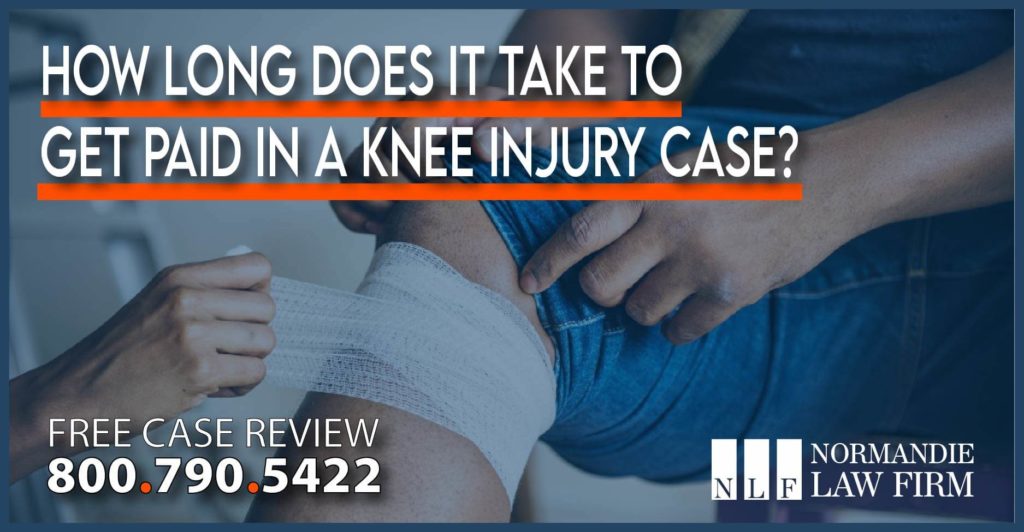No two knee injury cases are alike, and each client comes to us with their own set of questions. But there’s one question every client has on their mind: How long does it take to settle a knee injury case?
The prospect of dealing with a knee injury can seem overwhelming. There’s the physical injury, which may require surgery and many months of physical therapy. You may also be struggling with emotional trauma if you were injured in a car or motorcycle accident. Recovering from these damages requires monetary compensation, so of course, how fast you will get paid is first thought on your mind.
In all honesty, there is no universal amount of time that applies to each case. Some knee injury claims are settled within a few months, but others can take years depending on the degree of injury and the willingness of the other side to admit liability. However, we can provide you with an explanation of the case resolution process and how long each part of the process could take. For specific information on your case, you’ll need to speak with a lawyer who’s experienced in knee injury compensation claims.
The Los Angeles attorneys of Normandie will be happy to review your case and advise you of your legal options. Call us today to schedule a free consultation.
Resolution Process for a Knee Injury Case
Below is an outline of the process that your case will go through before you receive compensation. Many cases are settled during the negotiation stage, but court intervention may be necessary depending on the complexity of your injuries. That’s why we’ve included all the stages of a knee injury lawsuit, which may or may not apply to your specific case.
- Medical Assessment
Your lawyer must understand the full extent of your injuries before they can calculate a fair settlement. Aside from documenting your wounds, they will need to know how your accident will affect you for the rest of your life. The medical assessment can take place over several weeks or many months, depending on the severity of your injuries.
- Investigation
In order to demand compensation, you will need to prove who is responsible for causing your knee injury. Your attorney will gather evidence through a series of actions, such as reviewing CCTV footage, talking to witnesses, visiting the scene of the crime, and obtaining police reports.
- Negotiations
Once you and your attorney figure out the amount you’ll need to recover, a demand letter will be sent to the responsible party. The letter will give the reasons for why you are seeking a certain amount of compensation, and the date by which the payment should be made. The other side can pay this amount or send back a counter-offer, thereby kicking off the negotiation process.
There is no time limit for how long you can negotiate a settlement. But keep in mind that offers have to be made in writing and sent through the mail. If you’re suing a major entity like a corporation or government office, it will take a while for their attorneys to get to your claim. Thus, it’s not unusual for weeks to go by in between each offer and counter-offer.
- Lawsuit
If you’re unable to come to an agreement after months of negotiations, it’s time to move on to a lawsuit. The defendant (party at fault) can pay you the requested amount or dispute your claim, which would initiate the discovery process. During the discovery phase, both sides will prepare as if they’re going to trial. However, a trial is unlikely since 95 percent of knee injury cases are settled out of court. But just in case, your lawyer will need to depose (question) witnesses and hire experts who can testify on your behalf. You may also be required to attend independent medical exams with a doctor chosen by the defendant.
- Mediation
As we mentioned, most cases never make it to trial, which is expensive and time consuming for everyone. In order to encourage a settlement, the courts will order both sides to participate in mediation or alternative dispute resolution (ADR). This is a private meeting where you and the people you’re suing will make one last attempt to agree on a compensation amount. These sessions are mediated by a third party professional, whose only goal is to facilitate an agreement. If the mediation or ADR fails, your last option is to argue your case in front of a jury.
- Trial
Going to trial can seem scary, but your lawyer should prepare you for what’s to come and make you feel confident in their ability to win your case. Your trial could take up to a few months, or just a few days depending on the evidence and number of witnesses presented by both sides. At this point, it may be a year or more since the date of your injury.
We hope this outline was helpful in giving you a sense of when you can expect to get paid for your knee injury. Again, this is general information that may not apply to your own situation. However, there are many factors in your case that are beyond your control, so it’s important to have patience and not lose faith in your right to compensation.
Our Recent Verdicts and Settlements
$500,000
$599,000
$1.5 Million
$600,000
$525,000
$250,000
Types of Knee Injuries
- ACL: The ACL, or anterior cruciate ligament, is one of 4 ligaments connecting your shinbone and thigh bone. ACL injuries can occur from being hit in the knee, slamming the knee into a hard surface, or overextending the knee joint (sudden twisting of the joint).
- MCL: Like the ACL, the medial collateral ligament (MCL) can be torn by sudden turning and twisting.
- Torn meniscus: Think of the meniscus as a shock absorber between your shin and thigh bone. This rubbery cartilage can be torn when you make sudden twisting movements while bearing weight on your knee.
- Knee bursitis: The bursae are sacs of fluid that cover the knee joint, thereby allowing tendons and ligaments to move smoothly over the knee joint. Some knee injuries can inflame the bursae, resulting in knee bursitis.
- Patellar tendinitis: The patellar tendon runs from your kneecap to your shin bone. Patellar tendinitis occurs when this tendon becomes inflamed due to injury.
- Dislocated kneecap: This condition occurs when the patella, a triangular bone covering the kneecap, slides out of place. The patella usually slides to the side and may be visible depending on the severity of the dislocation.
- Loose bone or cartilage: Some injuries can cause pieces of cartilage or bone to break off and float around the knee joint. The floating piece can make it difficult to move your knee in certain directions.
- Total knee replacement: Knee replacement surgery may be required in cases of severe injury if you find it hard to do basic tasks like walking and going up the stairs. The procedure involves “resurfacing” the patella and replacing portions of bone and cartilage with spacers and metal pins.
The recovery process is long and expensive for any one of these injuries. You can also suffer from pain and limited mobility for the rest of your life, even after multiple surgeries. Thus, it’s important to find out about your rights and legal options.
Call the lawyers of Normandie and get started on a compensation claim for your knee injury.
Common Causes of Knee Injuries
- Car accidents: A car accident causes severe shock to your knee, causing significant damage to the bones, cartilage, tendons, and ligaments. Knee injuries associated with car wrecks include torn meniscus, ruptured tendon, and dislocation of the patella.
- Motorcycle accidents: Joint and ligament damage are the most common knee injuries associated with motorcycle accidents. Accident victims can also suffer from broken kneecaps, dislocated kneecaps, and ruptured tendons.
- Slip and Falls: Falling on to the knees is a natural reaction for many people when they slip on a wet surface. As a result, they may fracture their patella, twist the meniscus, or cause an ACL injury.
- Tripping over objects and debris: Tripping over things in stores and parking lots can cause you to land forcefully on your knees. This can result in numerous injuries, including patellar fractures, ACL injury, meniscus tearing, and dislocation of the kneecap.
- Workplace accident: Tripping and slip and falls can happen in workplaces, causing all the above injuries. Such accidents can also contribute to early onset arthritis in the knees, leaving you with pain, swelling, and stiffness for the rest of your life.
If you have a lawyer already, you’re probably aware that knee injury lawsuits take time to resolve. However, your attorney should be communicating with you regularly and doing everything they can to make progress in your case. They should also inspire confidence regarding their ability to recover the compensation you’re entitled to. If your lawyer is failing in these areas, it may be time to look for another attorney.
You can switch attorneys at any point during your lawsuit in the state of California. But you should carefully consider your reasons before you make the change. For example, maybe your attorney speaks to in a manner that rubs you the wrong way. But they may still be doing a great job in your case and fighting hard to bring you a fair settlement. This is difficult for most clients to figure out, since they don’t have experience with personal injury lawsuits. That’s why you should always have your case reviewed by another attorney before moving your case to a new law firm.
Furthermore, you should be aware of the consequences for terminating your client-attorney contract. These terms include paying your attorney for the work they’ve done on your case, which can be complicated if they’re working on a contingency fee basis. That means they are waiting until your case is settled to receive their fees, so they have a right to a portion of the compensation that’s recovered by your new attorney. But don’t let this discourage you – a knowledgeable lawyer can work out a fee agreement with your old attorney and notify the courts that you have changed counsel.
To find out how your attorney is doing with your case, contact the lawyers of Normandie Law Firm.
Free Second Opinions
Personal injury victims deserve qualified legal representation, and they shouldn’t have to pay for it. That’s why we’ve always offered free second opinions to anyone who’s unhappy with their attorney. If you decide to switch over to us, we will take your case on a contingency basis so there is nothing for you to pay upfront. With our Zero fee guarantee, we only get paid for our services if you recover payment for your injuries. So if we lose your case, you owe us nothing and the costs are on us.
Contact our office and schedule a free second opinion today.
Other Pages on Our Website Related to This Topic
How Long Does it Take to Settle an Injury Case Against Home Depot
How Long Does it Take to Settle a Train Injury Lawsuit
How Long Does It Take to Settle an Injury Case Against Walmart?













